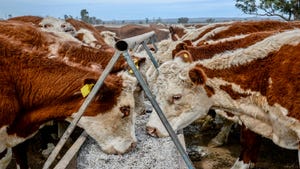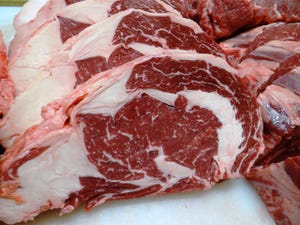Opinion: Why Doesn’t NCBA Fight For Its Reputation?
I have a serious beef with the National Cattlemen’s Beef Association (NCBA) relative to how it continually allows itself to be characterized by its opponents as being
November 5, 2010

I have a serious beef with the National Cattlemen’s Beef Association (NCBA) relative to how it continually allows itself to be characterized by its opponents as being run by the large multi-national packers. Anyone who understands how NCBA policy is formed and the makeup of the organization realizes that such claims are ludicrous. But, I also understand that the R-CALF tactic of mischaracterizing NCBA makes sense and has been successful – after all, by casting aspersions on the messenger, the message becomes less relevant.
I also understand NCBA’s longstanding policy to not get down in the muck with these activist groups and to instead focus on advancing the policies of its affiliated state cattlemen groups and tens of thousands of cow-calf producers who are members. NCBA’s policy may make sense relative to non-industry anti-beef groups like HSUS and PETA, but it’s a disservice to the NCBA membership to not address these claims within the industry.
I have sat in on hundreds of NCBA committee meetings. I’ve attended the mid year and annual conventions and participated in the policy process with my affiliated state associations that carried that policy forward. I have witnessed the 5,000+ producers at these conventions representing tens of thousands other producers via their state policy procedures, and I have witnessed untold numbers of debates and votes. In all that time, I’ve never seen the discussion or the vote be decided based on anything but what people thought was in the best interest of producers and the industry.
The R-CALF strategy makes sense in today’s political environment. Republicans are racist, mean-spirited and care only about the rich. Democrats are simply tax-and-spend liberals who redistribute wealth. The Tea Party is everything negative.
NCBA is for freedom of choice in marketing, and its membership believe that producers should have marketing options. The organization also believes that the government’s job isn’t to determine winners and losers, but simply to ensure a level playing field.
Without question such views are in direct conflict with those who believe government should protect producers from market demands, and determine winners and losers. These folks want to resurrect a commodity system and move away from the value-added revolution they feel puts them at a disadvantage.
These differences in world view and the different interpretations of the economics driving our industry are dramatic, and they are worthy of debate within the industry.
But those viewpoints pale in comparison to the differing interpretations of the main causes of the industry’s problems. One side believes that consolidation and lack of profitability are the result of changes in marketing structure, with captive supplies and value-based marketing being the main drivers. The other side believes that plummeting demand and a commodity system that made it difficult to compete with other protein sources on the basis of quality, uniformity and consistency is the problem. The latter group believes we must expand demand and margins globally and domestically and continue to move toward a marketing system that allows for differentiation based on quality.
These views are directly in conflict. One side believes government intervention can put the toothpaste back in the tube. It wants to revert to a 25-year-old model based on protectionism. The other believes we must regain and build demand to have an expanding and profitable industry, and that a commodity system will always produce breakeven prices that reward only low-cost producers, which will continue to drive industry consolidation and concentration.
NCBA is wrong in assuming that its only responsibility is to its members, even though it represents the overwhelming majority of producers. First of all, NCBA policy has never dictated how other producers can market their cattle and, in fact, defends its opposition’s right to market cattle however they desire. Meanwhile, the opposition’s position is only possible if it precludes other cattlemen from marketing their cattle according to their own best interests. Its beliefs aren’t compatible with NCBA’s free-enterprise principles.
I understand that NCBA must represent the views of its membership and can’t be overly concerned about outside views, but the internal debate is no different than the external debate. NCBA has to protect the business environment for all producers when attacked by outside activist groups that wish to destroy our industry. NCBA in a similar way should make sure that the facts are out there for the entire industry.
Certainly, since the very first days of the cattle industry, there have been differences of opinion; these will continue and they are healthy. But not responding to the very tactics that make politics in general so distasteful isn’t high minded, it’s an abdication of duty. Nobody is asking the Democrats and Republicans to get along, but if one side merely decided to ignore the other and allowed the opposition free rein to mischaracterize them, they might eventually find they aren’t viable.
I understand that the huge discrepancy in numbers of producers and cattle represented may have led NCBA to believe that the only internal debate they are interested in participating in, is what occurs through their own internal policy debates. If nothing else, the GIPSA rule debacle illustrates that internal communication within the industry is critical. It’s a debate that can’t be lost based on facts, but it can be lost based on perception if one side allows the other to characterize its position and membership as something they are not.
I don’t hate the packing industry; I respect them for the tremendous job they do of helping convert our inputs into a consumer-friendly form and the steps they’ve taken to capture maximum value for each carcass. They do a wonderful job.
But I also understand and respect the fact that as margin operators, the packer’s job is to pay as little for cattle as they can and to sell it as effectively as they can on the other side. We need each other but our interests aren’t the same.
Yes, both sides benefit from a growing industry and have some stake in growing beef demand as a result. But, ultimately, as the only fixed-cost producers in the system, cow-calf producers are the only ones who care about actual price levels and not the difference between the buy and sell.
The ironic thing is that both sides agree on the problems facing the industry, they just have different conclusions about what is causing those problems. The result is drastically different views on how to fix them.
-- Troy Marshall
You May Also Like



